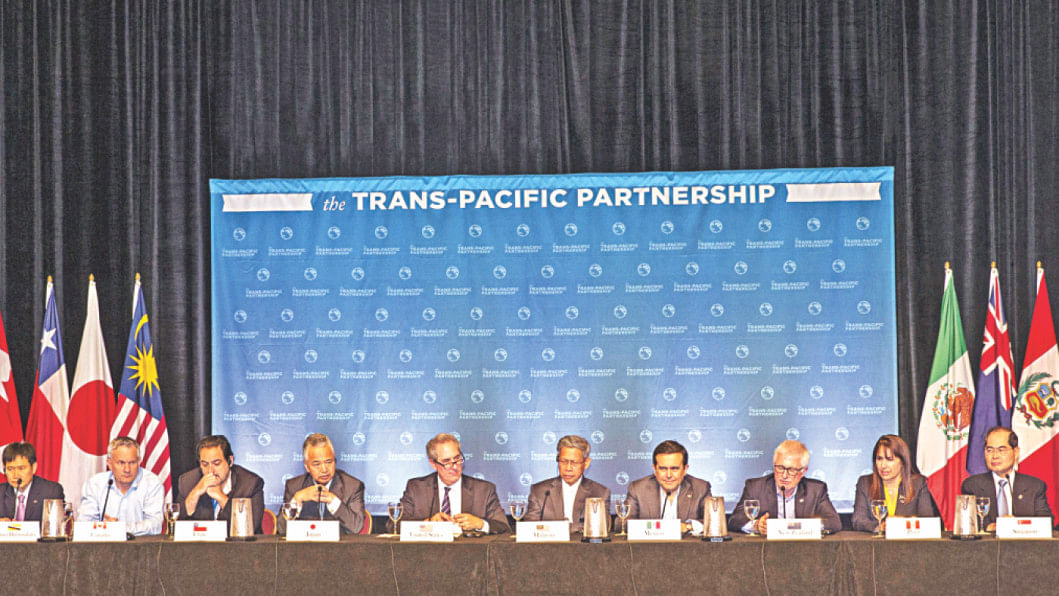Pacific trade talks fail to end in TPP deal

Delegates negotiating a vast Pacific free-trade agreement failed to reach a final deal Friday after several days of intense talks in Hawaii, in a setback to US President Barack Obama.
But US Trade Representative Michael Froman, in a statement on behalf of the 12 countries involved, insisted that "significant progress" had been made on the Trans-Pacific Partnership (TPP) agreement, the most ambitious trade deal in decades.
"After more than a week of productive meetings we've made significant progress and will continue on resolving a limited number of remaining issues, paving the way for the conclusion of the Trans-Pacific Partnership negotiations," Froman told a press conference.
The negotiators were "more confident than ever that the TPP is within reach," he said, adding that the Pacific Rim countries involved would continue to have bilateral discussions to try and iron out their remaining differences.
The TPP -- already eight years in the making -- would be a huge free-trade bloc encompassing 40 percent of the world's economy and part of Obama's much-vaunted "pivot" towards Asia in the face of an increasingly assertive China.
China, notably, is not included.
The press conference was delayed by several hours as the countries -- including the US, Australia, New Zealand, Japan and Canada -- attempted to thrash out a deal in what had been billed as the home straight, in talks that reportedly went deep into the night.
The failure by trade ministers to get the accord over the line on Friday are a blow to Obama -- who has faced opposition to the deal from fellow Democrats -- as it could see the TPP become campaign fodder with the United States facing elections in November 2016.
"The progress made this week reflects our long-standing commitment to deliver an ambitious, comprehensive and high-standard TPP agreement that will support jobs and economic growth across the Asia-Pacific region," Froman said.
The 12 countries involved have faced criticism for carrying out their negotiations in what opponents have charged is a high level of secrecy.
Its many critics say the proposals indicate a deal moving more toward protection than free trade; one more about corporate benefits than boosting economies and development.
But backers say the modern global economy needs a new framework of rules to protect intellectual property-dependent 21st century industries that are not covered in traditional free trade pacts like the World Trade Organization.
Trade ministers were keen to talk up the positives.
"Good progress was made this week, but a number of challenging issues remain, including intellectual property and market access for dairy products," New Zealand's Tim Groser said in a statement, touching on two of the outstanding sensitive issues.
Akira Amari, Japan's minister in charge of TPP negotiations, told reporters it would take another ministerial-level meeting to get the deal done.
"According to my understanding, it is our common view that we will hold a meeting by the end of August," Amari said, according to public broadcaster NHK.
"If we can't conclude it next time, it's going to be very hard."
Australian Minister for Trade and Investment Andrew Robb said they were "on the cusp," with "provisional decisions on more than 90 percent of issues."
The other countries involved are Brunei, Chile, Malaysia, Mexico, Peru, Singapore and Vietnam. Several prickly issues were believed to have held up the talks this week on the island of Maui, prime among them differences over agricultural markets, auto trade and protection for drug makers.
Also covered in the vast proposed pact are better copyright protection, workers rights and environmental protection.
"No deal means the TPP is thrown into the political maelstrom of the US presidential cycle," Lori Wallach, director of advocacy group Public Citizen's Global Trade Watch, said in a statement.
"And with opposition building in many countries there are reduced chances that a deal will ever be reached on a pact that US Trade Representative Michael Froman declared to be in its 'end game' in 2013 but that has become ever more controversial since.
"It's good news for people and the planet that no deal was done at this final do-or-die meeting given the TPP's threats to jobs, wages, safe food, affordable medicines and more."

 For all latest news, follow The Daily Star's Google News channel.
For all latest news, follow The Daily Star's Google News channel. 




Comments